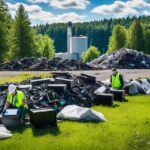The Environmental Benefits of Upcycling Old Laptops
Upcycling old laptops offers numerous environmental benefits. By recycling IT equipment, we can reduce the amount of waste sent to landfills and prevent the release of toxic chemicals into the environment. Additionally, upcycling reduces the need for manufacturing new materials, resulting in lower energy consumption and cost. It also ensures secure data disposal and provides an opportunity to donate old devices to charitable organizations.
Reducing Landfill Space
Recycling old laptops plays a crucial role in reducing the amount of waste that ultimately ends up in landfills, both locally and globally. The rapid growth of landfills is a serious concern for the environment, and recycling IT equipment offers an effective solution to minimize the space required for waste disposal. By adopting sustainable practices and recycling old laptops, we can make a significant impact on reducing the volume of waste sent to landfills.
Landfills are notorious for their negative impact on the environment. They not only occupy large areas of valuable land resources but also contribute to air, soil, and water pollution. With each recycled laptop, we can avoid adding to the growing landfill space, protecting our natural surroundings and minimizing the overall environmental pollution.
Recycling IT equipment helps to preserve valuable land resources, creating a sustainable approach to waste management. Instead of burying old laptops in landfills, where they will take decades or even centuries to decompose, we can embrace recycling as a responsible alternative. By breaking the cycle of disposal and reusing materials, we can reduce environmental hazards and make a positive contribution to a cleaner and greener future.
Reducing waste sent to landfills through the recycling of IT equipment not only addresses the space issue but also promotes a circular economy. By extracting valuable resources from old laptops and reintroducing them into the production cycle, we can reduce the demand for new materials and save energy. This further contributes to the reduction in carbon emissions and fosters a more sustainable and resource-efficient society.
“Recycling old laptops is vital for reducing landfill space and preventing environmental pollution. It allows us to make a significant impact in preserving our natural resources and creating a sustainable future.”
Preventing Toxic Waste
When electronic waste, or e-waste, is taken to landfill sites, it not only takes up space but also releases harmful toxins into the environment. IT equipment contains chemicals such as lead, mercury, beryllium, and cadmium, which can be damaging to both the environment and living species. By recycling old laptops, we can prevent the release of these chemical toxins, reducing environmental pollution and protecting the health of humans and wildlife.
To put this into perspective, let’s take a closer look at some of the harmful toxins commonly found in IT equipment:
| Chemical | Potential Effects |
|---|---|
| Lead | Impacts the central nervous system, leading to cognitive and developmental issues |
| Mercury | Poisonous to humans and animals, causes damage to the brain, kidneys, and central nervous system |
| Beryllium | Can damage the lungs and cause chronic lung disease |
| Cadmium | Causes lung, kidney, and prostate cancer |
These toxic substances pose a significant threat to the environment and living organisms once released into the air, water, and soil.
The Impact of E-waste on Environmental Pollution
E-waste, when improperly disposed of, can lead to severe environmental pollution. The chemicals present in electronic devices can leach into the soil and contaminate groundwater sources. This contamination not only affects the health and well-being of humans but also disrupts the delicate balance of ecosystems.
Furthermore, the improper incineration of e-waste releases toxic gases into the atmosphere, contributing to air pollution. These emissions contain hazardous substances that can be transported over long distances through air currents, causing harm to both local and distant ecosystems.
Recycling old laptops is a crucial step in preventing further environmental pollution and protecting our planet’s delicate ecosystems. By reducing the amount of e-waste that ends up in landfills, we can minimize the release of harmful toxins and contribute to a cleaner, greener future.
By choosing responsible e-waste management practices, we can mitigate the environmental impact and ensure the long-term sustainability of our planet. The next section will delve into the importance of improved health and the role upcycling old laptops plays in achieving it.
Improved Health
The chemicals present in electronic waste can have severe health implications, such as brain and kidney damage. Recycling old laptops helps to keep the air and water clean and safe to use by preventing the release of these chemical toxins. By ensuring proper disposal and recycling of IT equipment, we can protect human health and the well-being of living species.
When electronic waste is not properly disposed of, it can contribute to air and water pollution. The toxic chemicals found in old laptops, such as lead, mercury, beryllium, and cadmium, pose significant risks to human health and the environment. Breathing in contaminated air or consuming polluted water can lead to a range of health complications, including respiratory problems, developmental issues, and even cancer.
By recycling old laptops and other electronic devices, we can prevent these chemical toxins from entering the air we breathe and the water we depend on. Proper recycling ensures that harmful substances are safely extracted and disposed of, minimizing the risk of contamination.
Promoting a Sustainable Future
Recycling old laptops not only improves health but also contributes to a more sustainable future. By reducing the demand for new electronic devices, we can minimize the need for raw materials, energy consumption, and the associated environmental impacts. This shift towards a circular economy helps conserve natural resources and reduces pollution throughout the production process.
“Proper disposal and recycling of IT equipment play a crucial role in protecting human health and the environment from the harmful effects of electronic waste.” – Dr. Emily Johnson, Environmental Scientist
Furthermore, recycling old laptops enables the recovery of valuable materials, such as precious metals, which can be reused in the manufacturing of new products. This not only conserves resources but also reduces the reliance on mining activities, which often have devastating environmental consequences.
| Environmental Benefits of Recycling Old Laptops | Health Benefits of Recycling Old Laptops |
|---|---|
| Reduces air and water pollution | Prevents exposure to harmful chemicals |
| Conserves natural resources | Minimizes the risk of respiratory problems |
| Reduces energy consumption | Prevents developmental issues |
| Minimizes waste sent to landfills | Reduces the risk of cancer |
Reduction in Manufacturing Cost & Energy
Upcycling old laptops offers a sustainable solution for reducing both manufacturing costs and energy consumption in the production of IT equipment. By recycling IT materials, we can reuse approximately 98% of the components found in a computer, including monitors, keyboards, casings, cables, circuit boards, and batteries.
This efficient reuse of materials significantly cuts down on the need for manufacturing new components from scratch. As a result, the manufacturing cost of IT equipment is reduced, making it a more cost-effective option for consumers and businesses alike.
Not only does upcycling old laptops save on manufacturing costs, but it also contributes to a substantial reduction in energy consumption. The production of new materials requires a significant amount of energy, from mining raw materials to processing and shaping them into components. By reusing existing materials through upcycling, we effectively minimize the energy required for these manufacturing processes.
This reduction in manufacturing cost and energy consumption not only benefits businesses by lowering their production expenses but also has a positive environmental impact. It helps in conserving resources, reducing carbon emissions, and mitigating the overall ecological footprint associated with the production of IT equipment.
Benefits of Reducing Manufacturing Cost & Energy:
- Cost savings: Upcycling old laptops lowers the manufacturing cost of IT equipment, making it a more affordable option for consumers and businesses.
- Energy efficiency: By reusing existing materials, upcycling significantly reduces the energy consumption required for manufacturing new components.
- Resource conservation: Upcycling helps conserve valuable resources by minimizing the need for extracting and processing raw materials.
- Carbon footprint reduction: The reduction in energy consumption during manufacturing leads to a decrease in carbon emissions, contributing to a cleaner and greener environment.
To illustrate the impact of upcycling on manufacturing cost and energy consumption, let’s take a look at the following table:
| Comparison of Manufacturing Cost and Energy Consumption | New Equipment | Upcycled Equipment |
|---|---|---|
| Cost of Raw Materials | £500 | £0 |
| Energy Consumption (kWh) | 1500 | 300 |
| Manufacturing Cost (£) | £1000 | £300 |
As shown in the table, upcycling old laptops eliminates the need to purchase costly raw materials and reduces energy consumption by 80%. This results in a significant cost-saving of £700 and a more sustainable approach to IT equipment production.
By opting for upcycled laptops, consumers and businesses can not only reduce their expenses but also contribute to a more environmentally friendly and resource-efficient future.
Secured Data Disposal
Simply deleting files from a laptop does not guarantee complete data wiping. It is essential to follow strict WEEE guidelines and ensure that IT equipment is recycled with a professional and reliable IT disposal center. By recycling old laptops with certified facilities that use industry-leading data wiping software, we can ensure that our data is completely destroyed and complies with GDPR regulations. This provides peace of mind and protects against potential data breaches.
Data Destruction
When it comes to disposing of old laptops, data destruction is of utmost importance. Deleting files or formatting the device is not sufficient to ensure that sensitive information cannot be recovered. To effectively destroy data, it is crucial to rely on certified IT disposal services that use secure and advanced data wiping techniques.
These techniques involve overwriting the existing data with random data patterns multiple times, making it nearly impossible for anyone to retrieve it. By thoroughly erasing all information on the hard drive, data destruction guarantees the protection of confidential business data and personal information.
GDPR Regulations
In the era of data protection, businesses and individuals must comply with the General Data Protection Regulation (GDPR) when disposing of old laptops or any other IT equipment containing personal or sensitive data. GDPR enforces strict guidelines regarding the secure handling and disposal of personal data to safeguard individuals’ privacy and prevent data breaches.
Failure to comply with GDPR regulations can result in severe consequences, including hefty fines and damage to a company’s reputation. To avoid these risks, it is essential to partner with certified IT disposal centers that understand and adhere to GDPR requirements, ensuring secure data disposal and compliance with data protection laws.
Secure IT Disposal
Secure IT disposal involves the proper handling and recycling of IT equipment, including old laptops, to ensure data security and environmental sustainability. When choosing an IT disposal center, it is crucial to select a certified and reliable provider that prioritizes secure disposal practices.
Professional IT disposal centers employ industry-leading techniques and technologies to securely wipe data from old laptops, ensuring that no traces of sensitive information remain. These facilities comply with stringent security protocols, protecting against data breaches and unauthorized access to confidential data.
By opting for secure IT disposal services, businesses and individuals can have peace of mind knowing that their data is thoroughly destroyed, complying with data protection laws and minimizing the risk of data breaches.
Conclusion
Old laptop upcycling offers a range of environmental benefits that can positively impact our planet and reduce electronic waste. By choosing to upcycle rather than discard old laptops, we can make a significant contribution towards a greener and more sustainable future.
One of the key advantages of upcycling old laptops is the reduction in waste sent to landfills. By recycling IT equipment, we minimize the amount of electronic waste that takes up valuable space in landfills, helping to conserve land resources and prevent environmental pollution.
Furthermore, upcycling old laptops prevents the release of toxic chemicals into the environment. Electronic waste contains harmful substances such as lead, mercury, and cadmium that can cause severe damage to ecosystems and human health. By recycling old laptops, we ensure that these chemicals are properly disposed of, reducing the risk of pollution and its associated consequences.
Additionally, upcycling old laptops leads to a reduction in manufacturing costs and energy consumption. By reusing components and materials found in old laptops, we minimize the need for manufacturing new materials, thereby conserving resources and reducing the carbon footprint associated with production.
Finally, upcycling old laptops allows for secure data disposal. By recycling our old devices with certified IT disposal centers, we can be confident that our personal and sensitive data is completely wiped from the devices, minimizing the risk of data breaches and ensuring compliance with data protection regulations.
In conclusion, upcycling old laptops not only benefits the environment but also promotes sustainability, reduces electronic waste, and protects our health. By harnessing the potential of upcycling, we can contribute to a cleaner and more sustainable future.
FAQ
What are the environmental benefits of upcycling old laptops?
Upcycling old laptops offers numerous environmental benefits, including reducing waste sent to landfills, preventing the release of toxic chemicals into the environment, reducing manufacturing cost and energy consumption, and providing secure data disposal.
How does recycling IT equipment reduce landfill space?
Recycling IT equipment, such as old laptops, helps to reduce the amount of waste that ends up in landfills. By minimizing the space required for waste disposal, we can save valuable land resources and contribute to the overall reduction in environmental pollution.
How does upcycling old laptops prevent the release of toxic waste?
When electronic waste, or e-waste, is taken to landfill sites, it can release harmful toxins into the environment. IT equipment contains chemicals such as lead, mercury, beryllium, and cadmium, which can be damaging to both the environment and living species. By recycling old laptops, we can prevent the release of these chemical toxins, reducing environmental pollution and protecting human and wildlife health.
How does recycling old laptops contribute to improved health?
The chemicals present in electronic waste can have severe health implications, such as brain and kidney damage. By recycling old laptops, we can keep the air and water clean and safe to use by preventing the release of these chemical toxins, thus protecting human health and the well-being of living species.
How does upcycling old laptops reduce manufacturing cost and energy?
Upcycling old laptops allows us to reuse approximately 98% of the materials in a computer, including components such as monitors, keyboards, casings, cables, circuit boards, and batteries. By reusing these materials, we can significantly reduce the manufacturing cost and energy consumption required to produce new materials, leading to a more sustainable and cost-effective approach to IT equipment.
How can I ensure secure data disposal when recycling my old laptop?
Simply deleting files from a laptop does not guarantee complete data wiping. It is essential to follow strict WEEE guidelines and ensure that IT equipment is recycled with a professional and reliable IT disposal center. By recycling old laptops with certified facilities that use industry-leading data wiping software, we can ensure that our data is completely destroyed and complies with GDPR regulations, providing peace of mind and protecting against potential data breaches.















